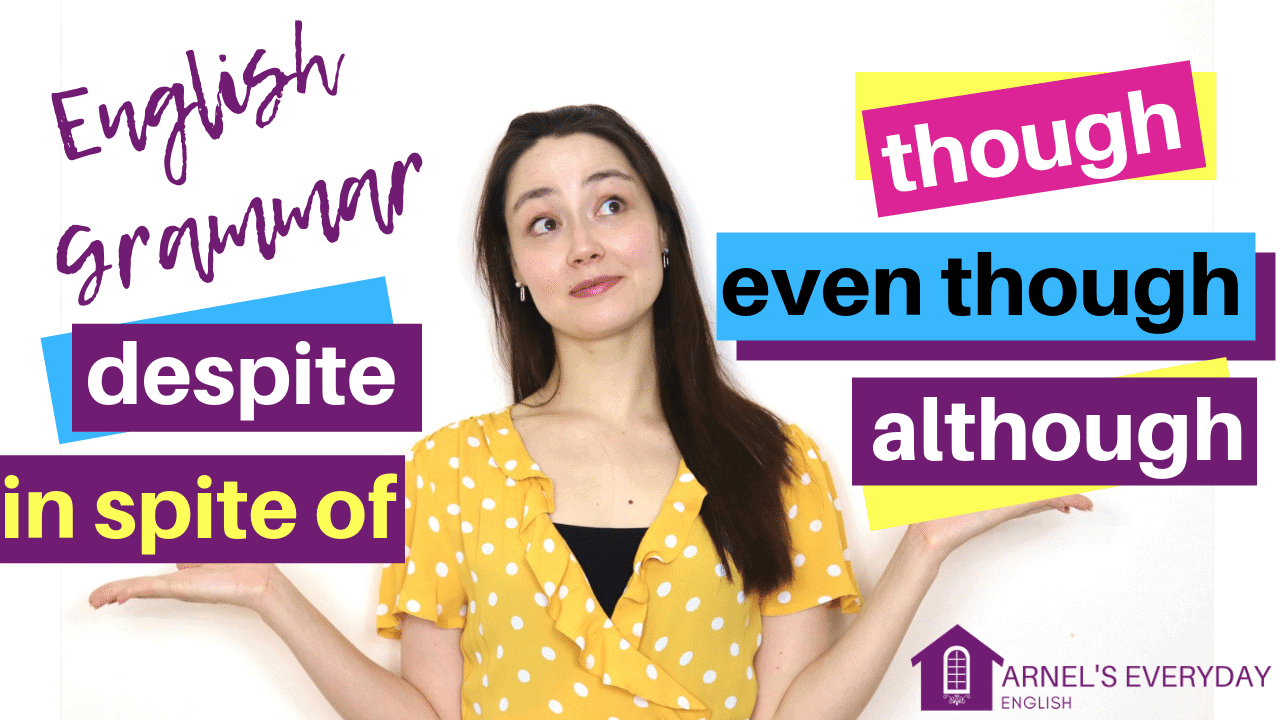in spite of, despite, although, and even though all show contrast.
We use these forms to say that A happens in contrast to B or vice versa.
All of these forms have the same meaning, but are used differently grammatically.
If you are a more visual learner, watch the video! Or keep reading 🙂
in spite of + noun / gerund
I went jogging in spite of the rain. (noun)
(Jogging and Rain show contrast. Normally people don’t like jogging in the rain.)
In spite of being underage, Tina went to a pub. (gerund)
(Underage and Pub show contrast. Normally people under 18 do not go to a pub.)
I went to work in spite of my cold. (noun)
(Work and Cold show contrast. Normally when people are ill they don’t go to work.)
You can replace ‘in spite of’ with ‘despite’…
despite + noun / gerund
I went jogging despite the rain. (noun)
(Jogging and Rain show contrast. Normally people don’t like jogging in the rain.)
Despite being underage, Tina went to a pub. (gerund)
(Underage and Pub show contrast. Normally people under 18 do not go to a pub.)
I went to work despite my cold. (noun)
(Work and Cold show contrast. Normally when people are ill they don’t go to work.)
We do not use despite with ‘of’!
Despite of being short, I’m a professional volleyball player.
☑ Despite being short, I’m a professional volleyball player.
It’s also possible to say:
in spite of the fact that + clause
In spite of the fact that I am allergic to cats, I own two!
(Allergic and Cats show contrast. Normally people with cat allergies do not own a cat.)
In spite that I am allergic to cats, I own two!
In spite of the fact that being allergic to cats, I won two!
despite the fact that + clause
I absolutely love Disney princesses, despite the fact that I’m 30.
(Being 30 and Disney Princesses show contrast. Normally only young girls love Disney Princesses.)
I absolutely love Disney princesses, despite of the fact that I’m 30.
I absolutely love Disney princesses, despite that I’m 30.
although + clause
When we use ‘although’ and ‘even though’ in the front position, we need a comma after the clause. If ‘although’ and ‘even though’ are in the mid position, we do not need a comma.
Although England is famous for tea, many people love coffee.
(England and Coffee show contrast. Normally England is associated with Tea.)
I went to watch the new Superman film with friends although I don’t like those type of films.
(Not liking and Watching show contrast. Normally if people don’t like a certain type of film, they don’t go to see it.)
Although the food wasn’t very good, we really enjoyed our time in that restaurant.
(Bad food and Enjoyment show contrast. Normally people don’t enjoy a restaurant if the food is bad.)
even though + clause
‘Even though’ is stronger than ‘although’. We use it to emphasise a greater contrast.
Even though I’m Italian, I don’t like pasta.
(This is a very big contrast.)
I bought a new pair of shoes even though I can’t afford it. I used my credit card.
(Buying something if you can’t afford it is a big contrast.)
Can you believe it? Jim got the job even though he never had an interview!
(Job and No Interview is a big contrast. Normally people must have an interview.)
So when do we use ‘though’?
‘Though’ can show contrast in informal spoken English. It can be used the same grammatically as ‘although’ and ‘even though’.
I left work an hour early although/even though/though my boss told me not to.
although = contrast
even though = strong contrast
though = contrast in informal spoken English










I said I didn’t like the video even though I loved it.
🙂 Good example Ernesto!!